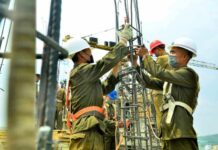Views expressed in this guest column do not necessarily reflect those of Daily NKLast week, the whole world watched with bated breath as an attempted military coup played out in Russia. The Wagner Group, which had been operating as a mercenary group for Russian President Vladimir Putin, occupied two major Russian cities and threatened to march on Moscow. Yet, Yevgeny Prigozhin, the head of the Wagner Group, later “canceled” the revolt and withdrew Wagner troops from the occupied cities following a phone call with the president of Belarus, Aleksandr Lukashenko.
Some observers may wonder if a similar kind of military rebellion would be possible in North Korea as well. As someone who has researched the North Korean military, I can confidently say that there is no possibility of a Wagner-style rebellion in North Korea.
First, let’s look at the current state of the Russian military. Upon returning to power in 2012, Putin set out to make Russia not only a more authoritarian country but also an expansionist country. Putin, who witnessed the collapse of the Soviet sphere of influence in 1990-1991, seems to be trying to recreate the Soviet Union’s glory days. It was at this time that a new strategist entered the scene. General Valery Gerasimov, designated the chief of the general staff of the Russian Armed Forces in 2012, put forth his new “hybrid warfare strategy.” His new conception of warfare incorporated a variety of strategies, including the use of mercenaries in military operations.
This strategy developed by Putin and Gerasimov gave birth to a number of paramilitary groups in Russia. Among these groups, the Wagner Group grew to become the most important. After Russia invaded Ukraine in February 2022, Putin ordered for weapons and military weapons to be sent to the Wagner Group, effectively expanding the organization into a mercenary army.
Prigozhin, the commander of the Wagner Group, is known to be both ruthless and reckless. He has recently demanded even more support for his troops, all while viciously criticizing both Gerasimov and Russian Defence Minister Sergei Shoigu. Prigozhon also drew attention during a video criticizing of the war efforts as led by a “[carefree] happy grandfather” who “might well turn out to be a complete ****head.” The remarks have been widely interpreted as a veiled criticism of Putin, who is often referred to as “grandfather.”
It was this recent sequence of events that spurred Putin to order for the Wagner Group to be brought into the regular Russian military, a move meant to bring the group under the Russian Ministry of Defence’s control. Instead, the Wagner Group rejected these orders and launched a revolt.
Stark differences exist between the Russian and North Korean militaries
Upon comparing the modern Russian military with its North Korean counterpart, a number of distinct differences arise.
First, Kim Jong Un is much younger than Putin. His grandfather Kim Il Sung may have dreamed until his dying breath about conquering South Korea, but his grandson Kim Jong Un seems to have no such plans. North Korea distinctly lacks the expansionist ambitions of Putin’s Russia.
Second, North Korea does not employ mercenary soldiers. North Korea has a much farther-reaching conscription system. While Russia does have a draft system enshrined in law, the majority of Russian men are exempt from conscription. By contrast, the vast majority of North Korean men enter the military, and their mandatory service period is the longest in the world. Even North Korean women are not exempt from being drafted into military service.
Additionally, unlike Russia, North Korea has shut down its borders. After Putin announced plans to mobilize more men to fight in Ukraine, tens of thousands of young Russian men who did not wish to join the war fled to other countries. North Koreans do not have this option. As such, the North Korean government has no need to employ mercenaries to fill out its ranks.
Moreover, North Korea is extremely wary of “private activities,” or those activities conducted outside of state control. The country’s socialist constitution stipulates that “individuals who operate private enterprises or businesses and generate large profits will be subject to reform through labor. Those who generated particularly large profits will be subject to up to five years of reform through labor, while those found to have engaged in particularly serious infractions will be sentenced to between five to ten years.” If all kinds of private business activity is banned, how could North Korea possibly tolerate the formation of a private military group?
Looking at these fundamental differences, it seems impossible to imagine a scenario like the Wagner Group revolt in North Korea. There is no way to know how the North Korean regime will one day meet its end, but it most certainly won’t end with a mercenary march on Pyongyang.
Translated by Rose Adams. Edited by Robert Lauler.
Views expressed in this guest column do not necessarily reflect those of Daily NK.


















